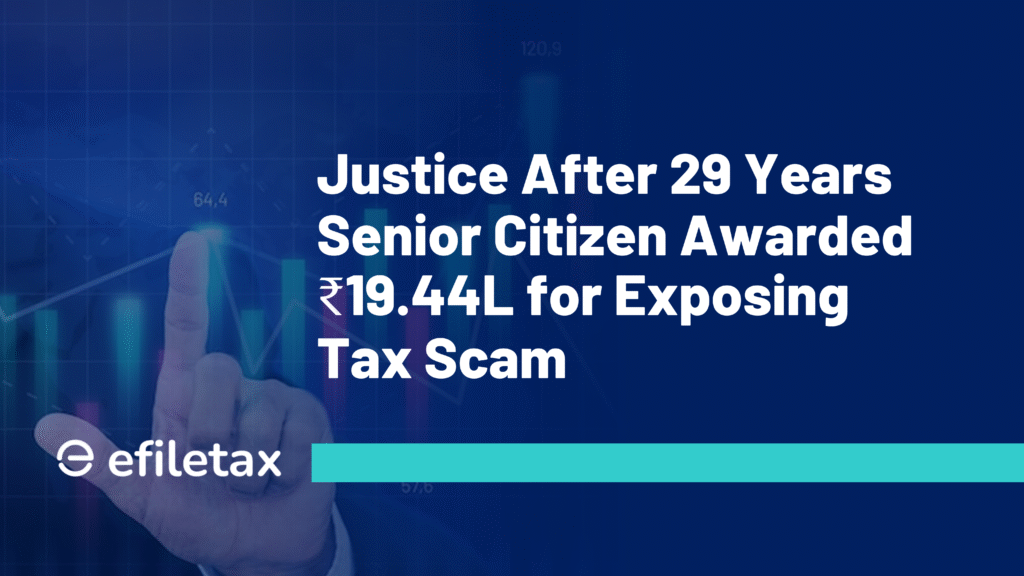
Tax evasion whistleblower rewarded after 29 years: ₹19.44 lakh for exposing nexus
In a rare but noteworthy development, the Central Board of Direct Taxes (CBDT) has rewarded a tax evasion whistleblower ₹19.44 lakh — 29 years after he exposed a massive nexus involving income concealment. This case offers a glimpse into how India’s tax informant system works and what delays can arise.
Let’s simplify the issue, understand the legal process, and explore what this means for future whistleblowers and tax governance.
Who is a tax evasion whistleblower?
A tax evasion whistleblower is a person who provides credible information to the Income Tax Department about individuals or entities concealing income or evading taxes. If the information results in tax recovery, the informant may receive a monetary reward as per CBDT’s guidelines.
Case summary: 76-year-old man wins reward after 29 years
- Informant filed a tip-off in 1996 against a well-known Surat-based group.
- His evidence led to significant tax recovery.
- But due to bureaucratic delays, he was forced to approach the courts.
- The Gujarat High Court, in its 2022 judgment, directed CBDT to reprocess his claim.
- Finally, on June 21, 2024, CBDT sanctioned a reward of ₹19.44 lakh.
🧾 Legal reference: CBDT Reward Scheme as per Income Tax Informants Reward Scheme, 2018
What is the Income Tax Informants Reward Scheme?
The current scheme was notified by CBDT in 2018, replacing earlier internal guidelines. It provides:
| Criteria | Reward Structure |
|---|---|
| Information leading to tax recovery | Up to ₹50 lakh |
| Information on undisclosed foreign assets | Up to ₹5 crore |
| Confidentiality | Full protection under law |
| Eligibility | Indian or foreign citizens can report via prescribed forms |
👉 Form for Indian citizens: Annexure–A of 2018 Scheme
👉 Form for foreign citizens (FATCA/CRS cases): Annexure–B
Key takeaways from the 29-year-old case
- Judicial push was critical: Without HC intervention, the reward may have never materialised.
- Delay in justice: 29 years is a stark reminder of systemic inefficiencies.
- Encouragement to whistleblowers: It reassures citizens that their efforts can be rewarded, albeit delayed.
Expert View: What whistleblowers should keep in mind
“Informants must preserve all original submissions, follow up through RTI, and seek legal help if ignored. The CBDT scheme works, but persistence is key.”
— Amit Mehta, Tax Lawyer, Gujarat High Court
How to become a tax evasion whistleblower?
Follow these steps:
- Collect authentic, verifiable evidence of tax evasion.
- Fill out the official Annexure–A form with full disclosure.
- Submit it to the Designated Authority as listed in the CBDT scheme.
- Maintain records of submission and communication.
- Track status using RTI or legal routes if delayed.
CBDT’s stance: Legal and ethical obligation
The CBDT reiterated in its June 2024 sanction order that the informant’s contribution led to revenue recovery and thus qualified for reward under the 2018 Reward Scheme, even if the initial complaint was from 1996.
📄 Citation: Gujarat HC Writ Petition No. 10432 of 2021
🔗 CBDT Informants Reward Page
Why this matters for Indian tax compliance
This case is more than a personal win. It highlights:
- The value of civic participation in tax governance
- The need for stronger administrative timelines
- The evolving attitude of tax authorities towards informants
Summary
A 76-year-old tax evasion whistleblower has finally received ₹19.44 lakh from CBDT, 29 years after exposing a major income concealment case. This case highlights India’s tax informant reward system and the role of judicial intervention in ensuring justice.
FAQ on Tax Evasion Whistleblower Reward
Q1. Who can become a tax informant in India?
Anyone with credible evidence — citizen or foreigner — can inform under the CBDT Reward Scheme.
Q2. Is the informant’s identity protected?
Yes. Full confidentiality is maintained as per CBDT norms.
Q3. How long does it take to get the reward?
There’s no fixed timeline. However, informants can approach courts if there’s undue delay.
Q4. Are there rewards for foreign assets too?
Yes, rewards go up to ₹5 crore for undisclosed foreign income/assets.
Final thoughts
If you’re aware of significant tax evasion, the system now has clear, legal routes to report it — with rewards attached. But as this case shows, patience and persistence are often needed to see justice.